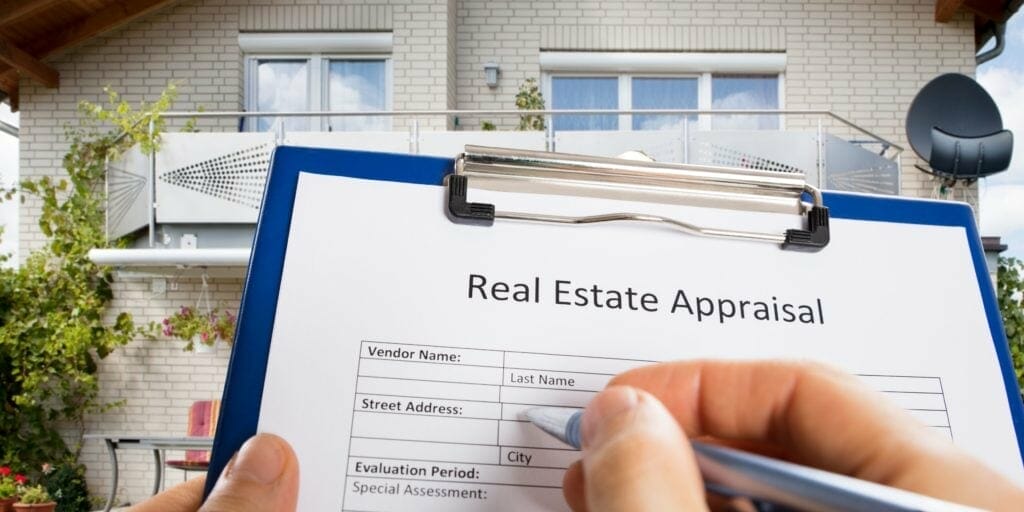
Commercial Real Estate Appraisal: What You Need to Know in 2023
If you’re considering buying or selling commercial real estate, it’s crucial to have a commercial real estate or commercial asset appraisal. A commercial appraisal will give you a good idea of what your property is worth, and this information can help you negotiate with potential buyers of your commercial building, but how to appraise commercial real estate?
This blog post will discuss what goes into a commercial real estate appraisal, how much does a real estate appraisal cost, how to appraise a commercial property and what you can expect from the process. We’ll also provide some tips on choosing an appraiser for your commercial properties.
Table of Contents
What is a commercial real estate appraisal?
A commercial real estate appraisal is an estimate of the value of a commercial property.
A commercial real estate appraisal report will be compiled based on factors such as the location, condition, size of the property, and recent sales of similar properties in the area.
Who conducts a commercial real estate appraisal?
A certified commercial real estate appraiser is a qualified professional who has experience estimating the value of commercial properties.
What does a commercial real estate appraiser do? The appraisal requirements for commercial real estate consist of visiting and inspecting the property and taking photos and notes. They will also research recent sales of similar properties in the area to develop a fair estimate of the property’s market value.
What is the process of a commercial real estate appraisal?
The commercial real estate appraisal process typically takes a few weeks.
After the licensed commercial real estate appraiser visits the property, they will compile their findings into a report that includes an estimate of its value.
This report will be submitted to you, and you can use it to negotiate with potential buyers or sellers.

How does a commercial real estate appraiser determine the value of a commercial property?
The appraiser will consider several factors when estimating the value of a commercial property, including:
The location of the property
Like most real estate sales, commercial real estate location will be a significant factor in its value.
The appraiser will consider the surrounding area, the property’s access to transportation and amenities, and any potential zoning changes that could affect the property’s value.
The condition of the property
If the commercial property’s condition is poor, it will likely be valued lower than a similar property in good condition.
The appraiser will take photos and notes of any damage or repairs that need to be made.
The size of the property
The commercial property’s size is another critical factor that will affect its value.
The appraiser will measure the property’s square footage and compare it to similar properties in the area.
The type of commercial property
Different types of commercial properties are valued differently.
For example, an office building will be valued differently than a retail store.
The appraiser will consider the type of property when estimating its value.
Recent sales of similar properties
When appraising commercial real estate, the appraiser will research recent sales of comparable properties in the area.
The commercial real estate market
The current state of the commercial real estate market will also be considered when estimating the value of a property.
If the market is strong, the property will likely be valued higher than if the market is weak.
Commercial Property Appraisal Cost
The cost of commercial property appraisals can be daunting. When it comes to leasing commercial property, how much is a commercial property appraisal can be an important factor to consider. Commercial property or commercial land appraisals are often required by lenders, investors, or other parties involved in a commercial real estate transaction, and can help to determine the fair market value of a property.
The cost of a commercial property appraisal can vary depending on a number of factors, including the type of property, the complexity of the appraisal, and the experience and qualifications of the appraiser.
While commercial or business property appraisal costs can add an additional expense to the leasing process, they can also provide valuable information and help to ensure that both the landlord and tenant are aware of the true value of the property in question.
So how much does it cost for a commerical appraisal? The number fluctuates according to what you are willing to do but equally, to get a truer value of your property some investment into an experienced and qualified appraiser is recommended.
What are some tips for choosing a commercial real estate appraiser?
If you’re considering buying or selling commercial real estate, it’s important to choose a qualified commercial real estate appraiser.
Here are some tips for choosing an appraiser:
- Check the appraiser’s credentials: Ensure the appraiser is licensed and has experience appraising commercial properties.
- Get multiple bids: Ask several appraisers to estimate the property’s value.
- Compare apples to apples: Make sure you’re comparing similar properties when considering different commercial real estate appraisals.
- Choose an appraiser you’re comfortable with: You should feel confident in the appraiser’s abilities and be able to communicate openly with them.
Commercial real estate appraisal costs can be hefty so make sure that you are well prepared in order to stay ahead of the game!

The Three valuation approaches to commercial real estate
When appraising commercial real estate, three main approaches can be used to estimate the value of a property income approach, cost approach, and sales comparison approach.
Here are the three commercial real estate appraisal approaches:
The Income Approach
The income approach estimates the value of a commercial property based on how much income it generates. This approach is most commonly used for properties that generate rental income, such as office buildings and apartment complexes.
To calculate the value using this approach, the appraiser will estimate the future income of the property
and then discount it back to the present value.
Sales Comparison Approach
The sales comparison approach values a commercial property based on its sale price relative to similar properties. This approach is most commonly used for properties bought and sold frequently, such as retail stores.
To calculate the value using this approach, the appraiser will research recent sales of similar properties and then adjust the sale prices for any differences.
The Cost Approach
The cost approach estimates the value of a commercial property based on the cost to replace it. This approach is most commonly used for properties with unique features, such as historic buildings.
To calculate the value using this approach, the appraiser will estimate the cost to rebuild the property and then subtract any depreciation.
Valuation Strategies in Commercial Real Estate Appraisals
Once the appraiser has estimated the property’s value using one or more of the approaches described above, they will develop a valuation strategy.
The valuation strategy is a plan for how the appraiser will use their value estimate in the commercial real estate transaction.
The three most common valuation strategies are:
Asking price strategy
The appraiser uses their estimate of value as the asking price for the property.
This strategy is most commonly used when the property is being sold by an owner who is not familiar with commercial real estate transactions.
Bid price strategy
The appraiser uses their estimate of value to determine the highest price that should be paid for the property.
This strategy is most commonly used when the property is being bought by an investor who plans to hold it for a long time.
Lending value strategy
The appraiser uses their estimate of value to determine the amount of money that can be borrowed against the property.
This strategy is most commonly used when the property is used as collateral for a loan.
Residential vs. Commercial Property Appraisals
While residential and commercial real estate appraisals may seem similar, there are some important differences that you should be aware of.
First, commercial real estate appraisals are generally more complex than residential appraisals. This is because commercial real estate property can be used for a wide variety of purposes, making it difficult to compare them to other properties.
Second, commercial real estate appraisals typically take longer to complete than residential appraisals. This is because there is usually more data that needs to be collected and analyzed.
Finally, commercial real estate appraisals often require the use of specialized knowledge and skills. This is because commercial properties can be very complex, and they often involve unique features that require a deep understanding of the market.
A commercial appraisal vs residential is in the details. Commercial real estate evaluations need more time and expertise than residential appraisals.

Is there anything else I should keep in mind with commercial real estate valuation?
The most important thing to keep in mind with commercial real estate property valuation is a complex process. Various approaches can be used, and each one has its strengths and weaknesses.
It is vital to work with an experienced appraiser who understands the market and the particular property you are interested in.
Also, remember that the valuation is only an estimate of the property’s value. It is not guaranteed, and the actual sale price may be higher or lower than the appraised value.
What are some overlooked aspects of the commercial real estate appraisal I should discuss with my appraiser?
One of the most important things to discuss with your commercial building appraiser is the scope of the commercial real estate appraisal. This means defining what exactly will be appraised.
For example, will the commercial real estate appraisal include a physical inspection of the property? If so, how extensive will that inspection be?
It is also important to discuss what type of commercial real estate market data will be used in the commercial real estate appraisal. This data can come from various sources, including government data, commercial real estate databases, financial institutions, and surveys of commercial real estate professionals.
Finally, you should also discuss what type of valuation approach will be used. As we’ve seen, various approaches can be used to value commercial real estate.
Who can see the results of the commercial appraisal report?
The commercial appraisal report is a confidential document. This means that it can only be seen by the parties involved in the transaction.
This includes the borrower, the lender, and the appraiser. The report will not be made available to the public.
Commercial property appraisal FAQs
Besides how to do a commercial appraisal, here are some other common questions that people have about commercial property appraisals:
How much is a commercial appraisal?
Commercial real estate appraisal cost depends on the size and complexity of the property being appraised. Appraisers typically charge by the hour, and fees can range from $500 to $2000.
Who pays for commercial appraisals?
If the appraisal is not being conducted by a lender, you will be responsible for covering the expenses. As a result, you should consider the cost of a commercial appraisal when creating your operating budget.
How long does a commercial appraisal take?
For those looking for a fast commercial appraisal report, as we mentioned earlier, commercial real estate appraisals can take longer to complete than residential appraisals. This is because they are generally more complex and involve more data. A commercial real estate appraiser typically takes two weeks to two months to complete a commercial appraisal.
What if I disagree with the commercial property appraisal?
If you disagree with the commercial property appraisal, you can ask the appraiser to reconsider their commercial property valuation. However, it is important to remember that the appraiser’s opinion is an opinion.
The parties involved in the transaction will make the final decision on the property value.
Where can I find a Commercial Real Estate Appraiser?
There are a few different ways to find a commercial real estate appraiser. You can search online or ask for recommendations from commercial real estate professionals. Be sure that you use a professional appraisal practice and they are licensed. It is well worth the extra effort to find tried and trusted commercial land appraisers!
How long are commercial appraisals good?
Commercial appraisals are typically valid for six months. However, they can be valid for a longer period if they are updated to reflect recent changes in the market. If you’re looking to sell commercial real estate, it’s important to work with an appraiser who is familiar with the current market conditions and can provide you with an up-to-date valuation.
The bottom line
Commercial real estate appraisal is a complex process.
It is important to work with an experienced and licensed commercial property appraiser who understands the market and the particular property you are interested in. Also, remember that the valuation is only an estimate of the property’s value. It is not guaranteed, and the actual sale price may be higher or lower than the appraised value.
If you need to get a commercial real estate appraisal, you may also be in the market to sell your commercial real estate fast. To get a no-obligation offer on your commercial real estate without paying hidden fees or commissions, contact us!
About The Author

Jesse Shemesh
Disclaimer
Please note that Point Acquisitions is not a tax expert or tax advisor. The information on our blogs and pages is for general informational purposes only and should not be relied upon as legal, tax, or accounting advice. Any information provided does not constitute professional advice or create an attorney-client or any other professional relationship. We recommend that you consult with your tax advisor or seek professional advice before making any decisions based on the information provided on our blogs and pages. Point Acquisitions is not responsible for any actions taken based on the information provided on our blogs and pages.
1031 Exchange Capital Gains Tax Deferral
According to a 2021 report by the National Real Estate Exchange Services (RES), over 240,000 1031 exchange transactions were completed in the United States, totaling $100 billion. This impressive figure underscores the role of 1031 exchanges in the real estate…
Read More1031 Exchange Benefits
As of Q4 2023, the national vacancy rate for all commercial property types in the United States sat at 9.2%, according to CBRE’s latest insights and research. This represents a slight decrease compared to the previous quarter and suggests a…
Read More1031 Exchange Legal Considerations: A Must-Read Guide
You’re in the right place if you’re considering a 1031 exchange for your commercial real estate investments. Whether you’re a seasoned investor or just dipping your toes into the market, understanding the legal landscape of 1031 exchanges is key to…
Read More

